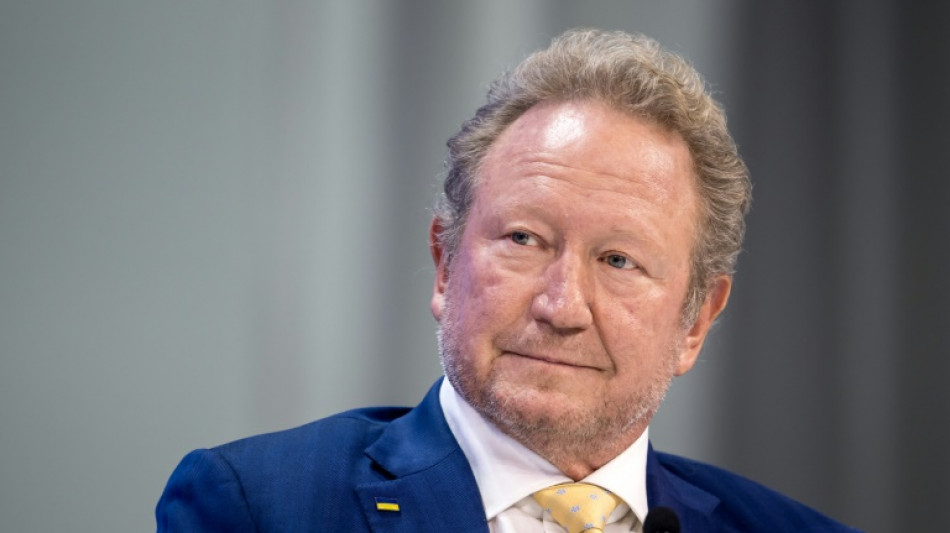Andrew Forrest, a blunt Australian billionaire who made his fortune in iron ore mining, stood out among the heads of emissions-spewing industries at the meeting of global elites in Davos.
He has been dubbed a "climate evangelist" who is working to decarbonise his company's operations and presses fellow industrialists to also stop burning fossil fuels.
"I'm saying to the industrial world, if the crabby, backwards old mining industry can do it, so can everyone else," Forrest told AFP in an interview in the Swiss Alpine resort.
Forrest is a regular at the World Economic Forum, where he came again this week to talk about climate change and sparred with an oil executive on the global energy transition.
His company, Fortescue, plans to use renewable power instead of diesel and natural gas across its energy-intensive mining operations by 2030.
He is also betting heavily on green hydrogen, ploughing billions of dollars into projects to produce the clean fuel by using renewable energy.
Last week, Forrest pledged to deliver 14 gigawatts in clean energy to Australia by the end of the decade through his solar and wind firm, Squadron Energy, which could power the equivalent of six million homes.
His critics point out that Forrest became rich through mining operations that last year alone emitted 2.5 million tonnes of greenhouse gases, more than a small Pacific island.
Forrest admits his own culpability.
"There's about 1,000 industrialists who are responsible for the consumption of oil and gas around the world. And I am one of those. I burn a billion litres of diesel a year," he said.
"But before you put my head up on a spike alone, look at the other 999, because at least I'm moving with thoroughly economic plans to eliminate all fossil fuels from my supply chain. And that's what I'm asking every other executive to do."
- 'Death race' -
Forrest reserves his most scathing criticism for the oil and gas industry, accusing it of "peddling poison".
He said the planet was in a "death race" and that the fossil fuel sector was "dragging the rest of the world down with them".
He said he asks oil executives the same question: "When will you allow your customers to stop burning fossil fuel?"
"If they said, 'well, we're not going to', then you say, 'thanks for telling the truth'. If they say, 'well, we are already', then you say, 'please don't treat me like a moron'."
During the UN's COP28 conference in Dubai last month, Forrest took out newspaper ads criticising the oil and gas industry and calling for a fossil fuel phase-out. The summit ended with an agreement for the world to transition away from fossil fuels.
In Davos on Thursday, he had a lively debate with Vicki Hollub, the CEO of US firm Occidental Petroleum, during a panel discussion on the energy transition.
"I haven't seen really anything just and fair about the fossil fuel sector," Forrest told the panel.
Hollub said the oil industry would play a "key part" in the energy transition, in part by continuing "to provide the fuel that the world needs".
While solar and wind energy can be used for power generation, maritime shipping, aviation and road haulage will still require fuel, she said.
"(In) the transition, as much as you would like, we cannot stop fossil fuels today," Hollub said.
- 'Miracle molecule' -
Forrest's campaign has drawn praise among some climate activists.
"Andrew Forrest has voiced the urgency to halt fossil fuel expansion and has been decidedly critical of oil companies," said Harjeet Singh, global engagement director for the Fossil Fuel Non-Proliferation Treaty Initiative, which campaigns for an end to the expansion of coal, gas and oil.
"We need a greater number of business leaders to fully acknowledge the enormity of the climate crisis and actively invest their resources in real solutions," Singh told AFP.
But Forrest's belief that hydrogen -- which he calls "the miracle molecule" -- will play a major part in the energy transition has drawn scepticism.
Hydrogen, which emits only water vapour, is touted for potential use in high-polluting industries such as transport, shipping and steel.
But producing it at mass scale is a major challenge, as costs remain high and the infrastructure is lacking so far.
The International Energy Agency (IEA) said in a report last week that only seven percent of projects announced worldwide to use renewables to produce hydrogen this decade are expected to come online by 2030.
IEA chief Fatih Birol told AFP it was good that "billionaires also want to see a clean energy future. This is great."
"Green hydrogen definitely belongs to the future of our clean energy mix," he added. "But one should be a bit careful not to have high expectations."
R.Prakash--BD
